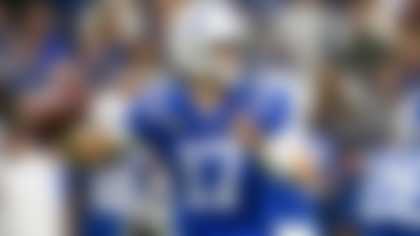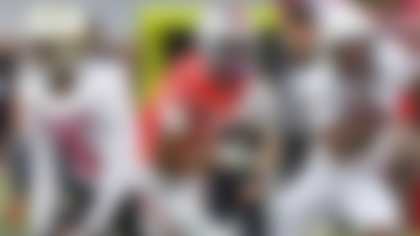BOCA RATON, Fla. -- The NFL concluded a largely quiet annual meeting -- in which owners and team executives spent the most time focusing on the future of the game -- with a flurry of news, the most impactful of which were several significant rules changes.
On Wednesday, owners approved a rule that will call for the automatic ejection of a player who gets two unsportsmanlike conduct penalties from a short list of fouls. The rule was approved on a one-year trial basis after several coaches expressed significant fear that it could lead to a spike in ejections. The NFL called 75 unsportsmanlike conduct penalties last year -- an unusually high number -- and members of the Competition Committee said they are concerned about sportsmanship, and that even NCAA rules officials have asked the NFL to take action because college players mimic NFL players.
"We have not been able to affect sportsmanship in a way we think we need to," Competition Committee chairman Rich McKay said.
Also approved for one year is a rule that will put the ball at the 25-yard line after a touchback on a kickoff. The hope is to limit the number of returns (plays which produce high injury rates). There is concern, though, that the rule could instead lead some teams to kick the ball high in the air, thus forcing returns from inside the 25 -- an unintended consequence the NFL wants to gauge before making the change permanent. That is how the NFL approached the longer extra-point try last season, a temporary rule that was made permanent at this meeting. The chop block, considered an exceptionally dangerous play for defensive linemen, was eliminated and the protection against horse-collar tackles was expanded to include grabbing at the nameplate on the jersey.
Those rule changes were positioned by league officials as attempts to reduce injuries -- and player safety became a dominant theme here after Jeff Miller, a senior league official charged with player safety, told a congressional committee roundtable last week that there was "certainly" a link between CTE and football. The question was raised again when Dallas Cowboys owner Jerry Jones indicated that he did not believe there was enough data about the consequences of head injuries to make any assumptions about its long-term effects. Commissioner Roger Goodell did not address Jones' comments directly, but he said that a possible link is consistent with the league's position.
"The most important thing for us is to support the medicine and scientists who determine what those connections are," Goodell said. "We think that the statements that have been made by Jeff Miller and others have been consistent with our position over the years. We've actually funded those studies. So we're not only aware of those and recognize them, but we support those studies.
"A lot of the research is still in its infancy, but we're trying to find ways to accelerate that."
After a meeting nearly devoid of off-the-field controversy, Goodell said that he had rejected the New England Patriots' request to reduce their penalty -- the loss of first- and fourth-round draft picks and a $1 million fine -- for the deflated-footballs incident that sprang from the 2014 AFC Championship Game. Pats owner Robert Kraft revealed earlier this week that he had sent a letter to Goodell saying that he thought new information -- in this case, the way Tom Brady played this season after the scandal erupted, and the ideal gas law, which Kraft said the league never took into consideration -- demanded that Goodell reconsider his punishment.
"I didn't think there was any new information in there that would cause us to alter the discipline," Goodell said. "There will be no changes to the discipline."
That means the Patriots will not have a first-round draft pick for next month's draft. Brady's own punishment -- a four-game suspension -- is currently being reviewed by an appeals court after a district court judge ruled in Brady's favor and vacated the suspension just before the start of the 2015 season.
Brady's case has spurred conversation between the league and the NFL Players Association about the scope of Goodell's role in discipline for off-the-field transgressions. On Wednesday, Goodell said a deal to reduce his power is not imminent.
"I've also been very open over the last several years and we have had discussion about the discipline process for decades," Goodell said. "If we can find a better discipline system, let's do it. We are not close to an agreement, by any stretch of the imagination, on a change to that, as it relates to a third party or other individuals making those decisions. But we are open to that and we'll continue to have that dialogue directly with the union. And if we can come up with a better system, we'll announce it at that point."
At the annual meeting a year ago, it first became clear that the NFL was intent on moving a team to Los Angeles. On Wednesday, Goodell confirmed reports that the NFL is looking to play a game in China soon. The Rams are believed to be among the teams that have volunteered for the game, which is expected to be played in the 2018 season, before their new stadium is completed at home. The game is the NFL's latest foray into international play, and an indication that in coming years, the NFL will seek to expand its market globally. In 2016, there will be three games played in London and one in Mexico City, but the NFL views China as a huge, untapped market for fan interest.
"I think the size and the influence of China in the global marketplace is obviously something you can't ignore," Goodell said. "You can't ignore that as a sport or a business or a nation. From our standpoint, we have lots of fans over there and more importantly, potential fans over there."
Follow Judy Battista on Twitter @judybattista.












